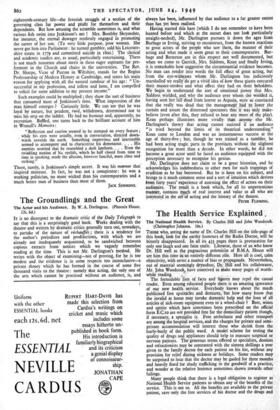The Groundlings and the Great
IT is no disrespect to the dramatic critic of the Daily Telegraph to say that this is a surprisingly good book. Works dealing with the theatre and written by dramatic critics generally turn out, nowadays, to partake of the nature of rechauffes ; there is a tendency for the author's prejudices and predilections, with which we are already not inadequately acquainted, to be sandwiched between copious extracts from notices which we vaguely remember reading at the time. This is not Mr. Darlington's method. He writes with the object of examining—not of proving, for he is too modest and the evidence is in some respects too inconclusive—a private theory which he has formed in the course of some five thousand visits to the theatre : namely that acting, the only one of the arts which cannot be practised without an audience, is, and always has been, influenced by that audience to a far greater extent than has yet been realised.
Having started this hare (which I do not remember to have been hunted before and which at the outset does not look particularly straight-necked), Mr. Darlington pursues it down the ages from Burbage to Irving, striving to reconstruct, from the known reactions to great actors of the people who saw them, the manner of their acting and what made it seem great to their contemporaries. Bur- bage and Betterton are in this respect not well documented, but when we come to Garrick, Mrs. Siddons, Kean and finally Irving, it is remarkable how suggestive the circumstantial evidence becomes. No man can render into words the full effect of great acting, but from the eye-witnesses whom Mr. Darlington has judiciously marshalled we really do get a vivid idea of how these giants executed their master-strokes and what effect they had on their beholders. We begin to understand the sort of emotional power that Mrs. Siddons wielded, and why the audience over whom she wielded it, having seen her fall dead from horror as Aspasia, were so. convinced that she really was dead that the management had to lower the curtain and assure the distressed spectators that it was only make- believe (even after this, they refused to hear any more of the play). Kean perhaps illustrates more vividly than anyone. else Mr. Darlington's theory that acting cannot succeed if an audience " is tried beyond the limits of its theatrical understanding." Kean came to London and was an instantaneous success at the age of thirty-five ; but, though he was trained as a tumbler, he had been acting tragic parts in the provinces without the slightest recognition for more than a decade. In other words, he did not become a great actor until he faced an audience, equipped with the perception necessary to recognise his genius.
Mr. Darlington does not claim to be a great historian, and he acknowledges his indebtedness to other men for such trappings of erudition as he has borrowed. But he is keen on his subject, and brings to it much common sense and a sort of intuition which derives from forty years' experience of assessing the effect of actors on their audiences. The result is a book which, for all its unpretentious manner, contains much of real interest and value to all who are interested in the art of acting and the history of the theatre.
PETER FLEMING.


































 Previous page
Previous page